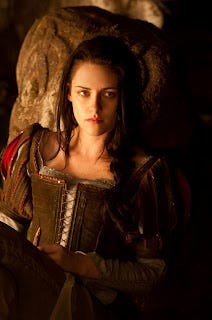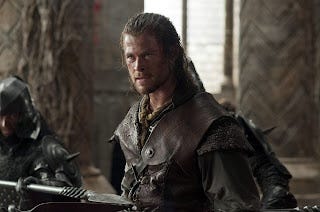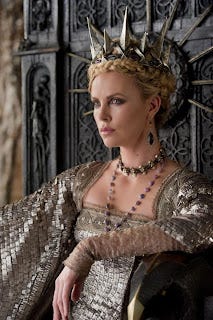Review: "Snow White and the Huntsman" flirts with creative brilliance

Film Rating: B
“Snow White and the Huntsman” is a deeply flawed film I have near limitless respect for. It is the rare major studio motion picture with vast ambition, brought to life by Rupert Sanders, a first-time director with the talent to execute as much of that vision as possible given the realities of this business. And the reality is that when a studio like Universal has given a rookie filmmaker $170 million to execute a popular, marketable fairy-tale set-up, artistic license is far from the only master being served. Unfortunately, it shows. Sanders and the screenwriters have come up with fascinating, insightful new interpretations of the title characters, the wicked Queen, and the world they inhabit, but the film’s greatest qualities are constantly held back by what feels like a studio-manufactured checklist of plot points and blockbuster pacing. Continue reading after the jump...
There appear to be two forces at work here: A studio desiring an epic, action-packed update on the familiar “Snow White” story, and a filmmaker wishing to offer a creative deconstruction and reconstruction of fairy-tale mythology. When the latter shines through, the film is excellent, but when it’s the former that appears to be at work, the drama falls flat on its face. The struggle between these two creative concepts ultimately drags down every part of the film, particularly the crucial, titular relationship between Snow White and the Huntsman.

Kristen Stewart as Snow White
It’s the film’s biggest disappointment, because I like the work done with these lead characters. I like it an awful lot. Snow White is given a backstory more overtly tragic than in most incarnations, and when actress Kristen Stewart first appears on screen, the character has been imprisoned in a dirty cell for the better part of a decade. Thus, this Snow White isn’t a passive, cheerful wet noodle waiting for strong men to come save her, but a deeply damaged individual intent on reclaiming years of lost freedom for herself and her people. Given that interpretation, casting Stewart in the part is a positively inspired move. She’s very talented at portraying damaged or confused individuals, and while the affectations and performance ticks that come along with that work against her in the horrid Twilight films, it all serves her quite well here. Stewart makes Snow White’s pain not only palpable, but compelling, and when she starts being truly proactive, rallying troops and inspiring those around her, Stewart really sells it as a natural piece of character evolution.

Chris Hemsworth as the Huntsman
Chris Hemsworth’s Hunstman is even better. His life, like Snow White’s, was ruined by the villainy of the wicked queen, and he’s fallen to drinking and misanthropy to cope. He’s your standard Han Solo antihero archetype, but with a clearly defined place and purpose in this world, and there are no actors working today better suited to play the part than Hemsworth. Just as Stewart can authentically play damaged, Hemsworth is believably rugged, powerful, and broken. He is – as all who saw “Thor” and “The Avengers” can attest to – a joy to watch.
In theory, the script does a fine job giving these two characters reasons not only to work together, but to profoundly fill gaps in the other’s existence. Yet the film’s story is so overstuffed, largely with familiar pieces of “Snow White” mythology but also with redundant action scenes, that there’s very little time for their relationship to develop. As soon as they meet, the Huntsman and Snow White are embroiled in battle, and once that’s finished, they must run away from danger, only to encounter another skirmish, then to meet a group of Dwarves, then to happen upon the film’s version of Prince Charming, etc. There’s not nearly enough downtime for the title characters to share meaningful conversations, let alone for their relationship to blossom into something more. When romance finally enters the film – through a well-written speech Hemsworth hits out of the park – it feels like a move out of left-field. The moment could be organic, there’s no doubt about that, but as presented, in context, there’s not enough development to give the scene its full dramatic weight. And in the last half-hour, the movie simply forgets these two are important to each other, as they share not one word of dialogue for the entire final stretch.
It’s the film’s largest and most frustrating failing, because if proper attention had been given to that one crucial relationship, other flaws would either disappear or be less of an issue. But as it stands, it’s hard for me to enjoy things like the film’s extremely clever interpretation of the Seven Dwarfs – played by established thespians like Bob Hoskins, Toby Jones, Ian McShane, Ray Winstone, and Nick Frost – when focusing on them takes away from the core relationship. And any amount of time spent on needless clichés like ‘Prince Charming’ simply infuriated me; the character is so obviously shoehorned in to appeal to audience familiarity that his role in the story isn’t just worthless, but actively harmful.
The film also suffers from pacing issues; as I said before, the story is overstuffed from serving too many creative masters, but it also feels like Sanders was given a quota of high-intensity moments he had to deliver, and that means the film often lurches forward when it really needs to rest and explore the characters. For instance, the way Snow White’s death and resurrection is accomplished and how it serves the narrative is rather ingenious, but the film doesn’t take time to explore the weight of her return. As it’s presented, her rise from the grave would essentially make her this world’s Jesus, but characters just shrug it off as a neat happenstance because they’re too busy getting ready for the next big scene.

Charlize Theron as the Queen
The wicked Queen is one of the trickier aspects of the film to judge. In theory, I think they’ve come up with an absolutely brilliant interpretation of the character. She’s not just evil and vain for the hell of it; the rigidity of fairy-tale gender roles have instead forced her into a corner, and she’s fighting back. There’s a vulnerability behind her actions, an earnest belief that beauty is the only power she has, and so for the first time ever in a “Snow White” adaptation, I felt her discussions with the mirror had dramatic weight. Those are the moments in which we see the human side of her, the side so desperate for approval that she’s willing to do just about anything to get it.
But Charlize Theron’s performance is, unfortunately, all over the map. I had no clear idea at any point in the film what Theron thought she was doing in the part; she screams, she whispers, she makes giant hand gestures, she gives subtle glares, she cries, she wails, she pouts, etc., but she does none of this with any sense of cohesive purpose. All the differing individual aspects of the performance never add up to anything greater, and her work is often wildly erratic within single scenes. Sometimes, especially early on, she comes close to making it all work, but for the majority of the film, I found her nearly unwatchable. One wonders if Theron’s personality was simply too large for a first-time director like Sanders to reign in and shape, a problem that often arises when rookie filmmakers work with big-name actors.

But that is, thankfully, Sanders’ only misstep as director. The narrative problems belong to other forces, I think, and the work he turns in throughout the film establishes him as a major cinematic voice worth listening to. To call the film visually lush would be an understatement; every set is immaculately designed, every costume believable and interesting, every battle scene (even the repetitive ones) riveting, every special effect executed perfectly, and every frame flawlessly photographed. But unlike much of, say, Tim Burton’s recent work, the visual poetry isn’t without purpose. Every location and design choice stems organically from the narrative, working in tandem with the best of what the story and characters have to offer.
That the story and characters don’t deliver on their full potential is, indeed, disappointing, because “Snow White and the Huntsman” possesses a rather clear potential for greatness. The end result is messy, and makes it impossible to recommend unequivocally, but for a major studio film serving so many interests to arrive with this many positive qualities is nothing short of miraculous. The film is a fascinating, noble cinematic effort, one I urge readers to experience for themselves.

